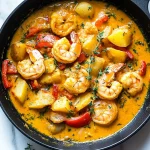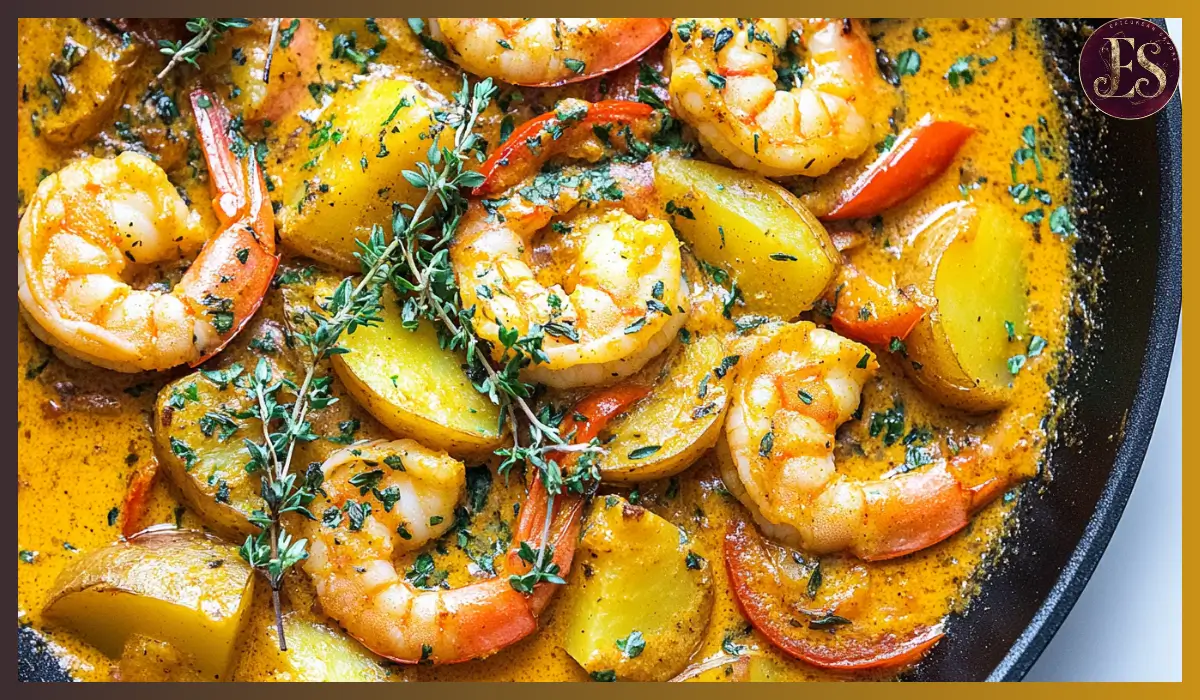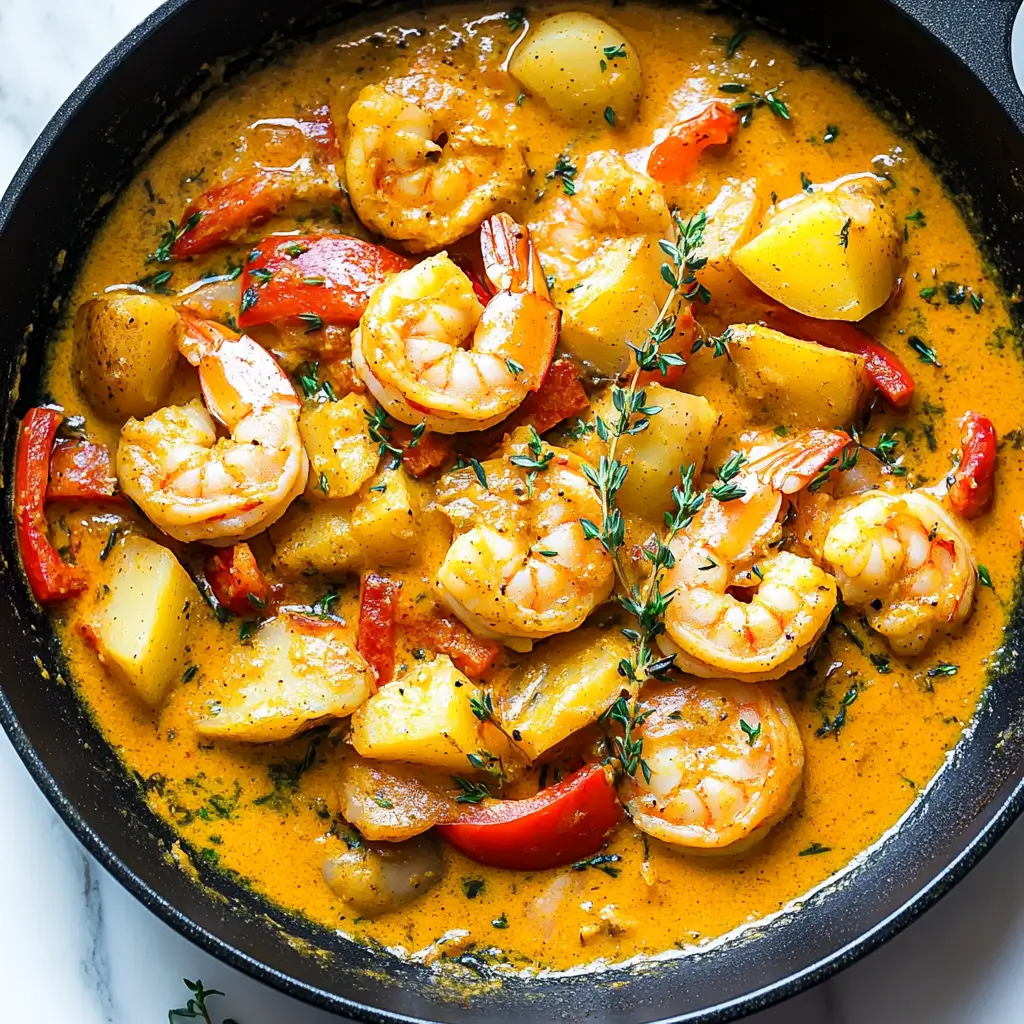There’s something about a rich, creamy, and flavorful coconut curry shrimp that just feels like comfort in a bowl. The warmth of the spices, the luscious texture of the coconut milk, and the tender, juicy shrimp all come together to create a dish that is both satisfying and incredibly easy to prepare. Whether you’re a seasoned home cook or someone just starting out, this recipe is straightforward, requiring minimal prep time and delivering maximum flavor.
Coconut curry shrimp is inspired by Caribbean and South Asian flavors, blending fragrant spices like cumin, turmeric, and curry powder with the smooth, slightly sweet taste of coconut milk. The best part? This dish comes together in just 30 minutes, making it perfect for a quick weeknight dinner or a meal to impress your family and friends. It’s also dairy-free, naturally gluten-free, and packed with protein—a win for anyone looking for a wholesome, nutritious meal.
I first fell in love with coconut curry shrimp while traveling, where I had the pleasure of tasting various versions of this dish in small, family-run restaurants. Some versions were spicier, some sweeter, and some loaded with additional vegetables. No matter where I tried it, the essence of the dish remained the same—a balance of creamy, spicy, and savory flavors that made every bite irresistible. That’s why I was determined to recreate a version that’s easy to make at home, using ingredients that are readily available and techniques that require minimal effort.
If you’re looking for a recipe that delivers restaurant-quality flavor without the hassle, this coconut curry shrimp is it. It’s rich, comforting, and perfect over a steaming bowl of rice or alongside warm, fluffy naan. Plus, it’s highly adaptable—you can tweak the spice levels, swap out ingredients based on what you have on hand, or even make it vegetarian.
Why You’ll Love This Recipe
This coconut curry shrimp recipe is a game-changer, and here’s why you’ll love it:
- Quick and Easy – With just 30 minutes of cooking time, this dish is perfect for busy weeknights or last-minute meal planning. There’s minimal chopping involved, and the ingredients come together effortlessly.
- Rich and Flavorful – The combination of fragrant spices, creamy coconut milk, and juicy shrimp creates a dish that’s bursting with flavor. Each bite is layered with warmth from the curry, richness from the coconut, and a touch of sweetness that balances everything perfectly.
- Healthy and Nutritious – Shrimp is an excellent source of lean protein, while coconut milk provides healthy fats that keep you full and satisfied. Plus, the dish is naturally gluten-free and dairy-free.
Health Benefits of Coconut Curry Shrimp
Not only is this dish delicious, but it also comes with a host of health benefits. Let’s take a closer look at some of the key ingredients and how they contribute to a balanced, nutritious meal.
1. Shrimp: A Lean Protein Powerhouse
Shrimp is low in calories yet high in protein, making it an excellent choice for those looking to build or maintain muscle. It is also rich in omega-3 fatty acids, which support heart and brain health. Additionally, shrimp provides essential vitamins and minerals like selenium, vitamin B12, and iodine, which are crucial for thyroid function and metabolism.
2. Coconut Milk: Healthy Fats for Sustained Energy
Coconut milk is a fantastic source of medium-chain triglycerides (MCTs), which are known to provide quick energy and support brain function. Unlike some saturated fats, MCTs are easily digestible and may even aid in weight management. Additionally, coconut milk contains lauric acid, which has antimicrobial properties that help boost immunity.
3. Curry Spices: Anti-Inflammatory and Digestive Benefits
Curry powder is a blend of various spices, each offering its own health benefits. Turmeric, a key component of curry powder, contains curcumin, a powerful anti-inflammatory compound that has been linked to reduced risk of chronic diseases. Cumin and coriander aid digestion, while ginger helps soothe an upset stomach.
4. Garlic and Onion: Natural Immunity Boosters
Both garlic and onion contain antioxidants and sulfur compounds that support the immune system and have antibacterial properties. They are also known to promote heart health by helping regulate blood pressure and cholesterol levels.
Preparation Time, Servings, and Nutritional Information
Time Required
- Preparation Time: 10 minutes
- Cooking Time: 20 minutes
- Total Time: 30 minutes
Servings
- Serves: 4 people
Nutritional Information (Per Serving)
- Calories: 420
- Protein: 35g
- Fat: 22g
- Carbohydrates: 18g
- Fiber: 3g
- Sugar: 4g
- Sodium: 750mg
This dish provides a balanced macronutrient profile, offering a good mix of protein, healthy fats, and fiber, making it a great meal option for those looking for a nourishing yet indulgent dish.
Ingredients List
Here’s what you’ll need to make this delicious coconut curry shrimp:
For the Shrimp:
- 2 lbs large shrimp, peeled and deveined
- 1 teaspoon salt
- ½ teaspoon black pepper
- ½ teaspoon turmeric
- 1 tablespoon curry powder
For the Curry Sauce:
- 2 tablespoons olive oil or coconut oil
- 1 medium yellow onion, thinly sliced
- 1 bell pepper (red, yellow, or green), sliced
- 3 cloves garlic, minced
- 1 teaspoon fresh ginger, grated
- 1 teaspoon ground cumin
- 1 teaspoon coriander
- ½ teaspoon cayenne pepper (adjust to taste)
- 2 tablespoons curry powder (Jamaican-style or Madras)
- 1 can (14 oz) full-fat coconut milk
- 1 cup seafood or chicken broth
- 1 teaspoon salt (adjust to taste)
- ½ teaspoon black pepper
- ½ teaspoon sugar (optional, to balance flavors)
- 1 teaspoon lime juice
- 2 sprigs fresh thyme or ½ teaspoon dried thyme
- 1 tablespoon fresh cilantro, chopped (for garnish)
Step-By-Step Cooking Instructions
Season the Shrimp
In a bowl, toss the shrimp with salt, black pepper, turmeric, and curry powder. Let them sit while you prepare the other ingredients. This allows the shrimp to absorb the seasoning, enhancing their flavor.
Sauté the Vegetables
Heat olive oil in a large skillet over medium heat. Add the onions and bell peppers, sautéing for 5 minutes until they become soft and slightly caramelized.
Add Garlic, Ginger, and Spices
Stir in the minced garlic and grated ginger, cooking for 1-2 minutes until fragrant. Then, add the curry powder, cumin, coriander, and cayenne pepper. Let the spices toast for about 1 minute, stirring frequently. This step helps develop deeper flavors.
Add the Liquid Ingredients
Pour in the coconut milk, seafood broth, thyme, and sugar (if using). Stir well and bring the mixture to a simmer. Let it cook for about 5 minutes, allowing the flavors to meld together.
Cook the Shrimp
Add the seasoned shrimp to the pan. Stir everything together, making sure the shrimp are evenly coated in the sauce. Cover the pan and let the shrimp cook for 5 minutes, or until they turn pink and opaque.
Final Touches
Squeeze in fresh lime juice and garnish with chopped cilantro. Stir to combine.
Serve and Enjoy
Serve hot over steamed rice, naan, or roti for the ultimate meal.
How to Serve
1. Over Steamed Rice
One of the most classic ways to serve coconut curry shrimp is over a bed of steamed white or jasmine rice. The rice helps balance out the bold flavors of the curry and absorbs the delicious coconut sauce beautifully. If you prefer a nuttier flavor, try using brown rice or basmati rice instead.
2. With Naan or Roti
For a more interactive and hands-on meal, serve this dish with naan, roti, or paratha. These soft, chewy breads are perfect for scooping up the shrimp and soaking up the flavorful sauce. You can either make them fresh at home or buy them from a store and warm them up before serving.
3. Low-Carb Options
If you’re looking for a lower-carb alternative, serve your curry with cauliflower rice or zucchini noodles. These options provide a similar texture while keeping the dish light and keto-friendly.
4. With a Simple Salad
A fresh side salad can help lighten up the meal. A crisp cucumber and tomato salad with a light lemon vinaigrette complements the richness of the curry without overpowering it. Alternatively, a mango avocado salad with a touch of lime juice adds a refreshing sweetness that pairs beautifully with the spices.
5. Side of Roasted Vegetables
For added nutrition, serve this dish with roasted or steamed vegetables such as broccoli, asparagus, or carrots. The slightly charred edges of roasted vegetables bring an extra layer of depth to the meal.
Pairing Suggestions
Pairing this dish with the right beverages and sides enhances the overall dining experience. Since coconut curry shrimp has bold, warm, and slightly spicy flavors, you’ll want to choose pairings that either contrast or complement these elements.
1. Beverage Pairings
- Coconut Water: A light and refreshing drink that enhances the tropical flavors of the dish.
- Lemon or Lime Sparkling Water: The slight acidity cuts through the richness of the coconut milk, providing a nice balance.
- Iced Ginger Tea: The mild spiciness of ginger tea pairs well with the warmth of the curry spices.
- Fresh Mango or Pineapple Juice: These fruity drinks add natural sweetness, complementing the curry’s spice.
- Mint Lemonade: The freshness of mint and citrus helps cleanse the palate between bites.
2. Side Dish Pairings
- Lentils or Chickpeas: Serve a small portion of curried lentils or spiced chickpeas on the side for added protein and texture.
- Coconut Rice: If you want to enhance the coconut flavor, try serving the shrimp with lightly sweetened coconut rice.
- Pickled Vegetables: A side of quick-pickled carrots, onions, or cucumbers adds acidity that balances the dish’s richness.
Storage, Freezing & Reheating Instructions
Storing Leftovers
If you have leftovers, don’t worry—this dish stores beautifully and tastes even better the next day as the flavors continue to develop.
- Refrigeration: Store leftover coconut curry shrimp in an airtight container in the refrigerator for up to 3-4 days.
- Avoid Overcrowding: When storing, make sure the shrimp is fully submerged in the sauce to prevent it from drying out.
Freezing Instructions
While this dish is best enjoyed fresh, you can freeze it if needed. However, note that coconut milk can sometimes separate when frozen, so reheating may require a little extra care.
- How to Freeze: Let the curry cool completely before transferring it to a freezer-safe container or zip-top bag. Label it with the date and freeze for up to 3 months.
- Best Practices: If you plan to freeze this dish, consider removing the shrimp before freezing and adding fresh shrimp when you reheat it. This prevents the shrimp from becoming overcooked and rubbery.
Reheating Instructions
- Stovetop Method (Best Option): Pour the curry into a pan over low to medium heat. Stir occasionally, adding a splash of broth or coconut milk if the sauce has thickened too much. Heat until warmed through, about 5-7 minutes.
- Microwave Method: Transfer a portion to a microwave-safe dish and heat in 30-second intervals, stirring between each until hot.
- Frozen Curry: If reheating from frozen, thaw in the refrigerator overnight before following the stovetop reheating method.
Common Mistakes to Avoid
Even though this dish is easy to make, there are a few common mistakes that can affect the final result. Here’s how to avoid them:
1. Overcooking the Shrimp
Shrimp cooks very quickly, usually in about 5 minutes. Overcooking them can make them tough and rubbery. Be sure to remove the shrimp from heat as soon as they turn pink and opaque.
2. Using Low-Fat Coconut Milk
Full-fat coconut milk provides the best creamy texture and rich flavor. Low-fat versions tend to be too watery and can result in a thinner, less flavorful sauce.
3. Not Toasting the Spices
Adding spices directly to liquid without first cooking them in oil reduces their potency. Always toast curry powder and other spices in oil for at least 1 minute to release their full flavor.
4. Adding Shrimp Too Early
Shrimp should be the last ingredient added to the pot since they cook quickly. Adding them too soon can cause them to become rubbery by the time the dish is finished.
5. Skipping the Fresh Herbs and Lime Juice
A final touch of fresh cilantro and a squeeze of lime juice adds brightness and enhances the depth of flavors in the dish. Don’t skip this step!
Pro Tips for the Best Coconut Curry Shrimp
1. Use Fresh, High-Quality Shrimp
For the best texture and flavor, use fresh or high-quality frozen shrimp. Avoid pre-cooked shrimp, as they won’t absorb the flavors as well.
2. Adjust the Spice Level to Your Preference
If you love spicy food, add a Scotch bonnet or habanero pepper to the curry. If you prefer a milder dish, reduce or omit the cayenne.
3. Don’t Skip Marinating the Shrimp
Even a quick 10-minute seasoning before cooking helps the shrimp absorb more flavor.
4. Let the Curry Simmer for Depth of Flavor
Allowing the sauce to simmer for at least 10 minutes before adding the shrimp gives the flavors time to develop.
5. Serve Immediately for the Best Texture
Shrimp is best enjoyed fresh, so serve the dish as soon as it’s ready for optimal taste and texture.
Frequently Asked Questions (FAQs)
1. Can I use frozen shrimp?
Yes! Just make sure to thaw and pat them dry before using.
2. How can I make this dish vegetarian?
Substitute shrimp with tofu, chickpeas, or cauliflower.
3. What type of curry powder should I use?
Jamaican curry powder is ideal, but Madras curry powder works too.
Conclusion & Call to Action
This coconut curry shrimp is a quick, easy, and flavorful dish that brings warmth and comfort to the table. Give it a try and let me know how it turns out in the comments! If you loved it, share it with your friends and family. Enjoy!
Print
Coconut Curry Shrimp
- Total Time: 30 minutes
- Yield: 4 servings 1x
- Diet: Gluten Free
Description
A quick and flavorful Coconut Curry Shrimp recipe featuring juicy shrimp simmered in a rich, spiced coconut sauce. Ready in 30 minutes, this dish is perfect over rice or with warm naan.
Ingredients
- 2 lbs large shrimp, peeled and deveined
- 2 tbsp olive oil or coconut oil
- 1 medium onion, sliced
- 1 bell pepper, sliced
- 3 cloves garlic, minced
- 1 tsp fresh ginger, grated
- 2 tbsp curry powder (Jamaican-style or Madras)
- 1 tsp ground cumin
- ½ tsp cayenne pepper (optional)
- 1 can (14 oz) full-fat coconut milk
- 1 cup seafood or chicken broth
- 1 tsp salt (adjust to taste)
- ½ tsp black pepper
- 1 tsp lime juice
- 2 sprigs fresh thyme (or ½ tsp dried thyme)
- 1 tbsp fresh cilantro, chopped (for garnish)
Instructions
- Season the Shrimp: Toss shrimp with salt, black pepper, turmeric, and 1 tbsp curry powder. Let it sit while you prep the ingredients.
- Sauté Vegetables: Heat olive oil in a pan, then sauté onions and bell peppers until softened.
- Add Aromatics & Spices: Stir in garlic, ginger, curry powder, cumin, and cayenne, cooking for 1 minute.
- Pour in Liquids: Add coconut milk, broth, thyme, and lime juice, bringing it to a simmer for 5 minutes.
- Cook Shrimp: Add shrimp, stirring well, and cook for about 5 minutes until pink and fully cooked.
- Finish & Serve: Stir in cilantro and serve hot over rice, naan, or roasted vegetables.
Notes
- Adjust spice level by adding or omitting cayenne pepper.
- Substitute shrimp with chicken, tofu, or chickpeas for variations.
- Use full-fat coconut milk for the best creamy texture.
- Prep Time: 10 minutes
- Cook Time: 20 minutes
- Category: Main Dish
- Method: Stovetop
- Cuisine: Caribbean, Asian


